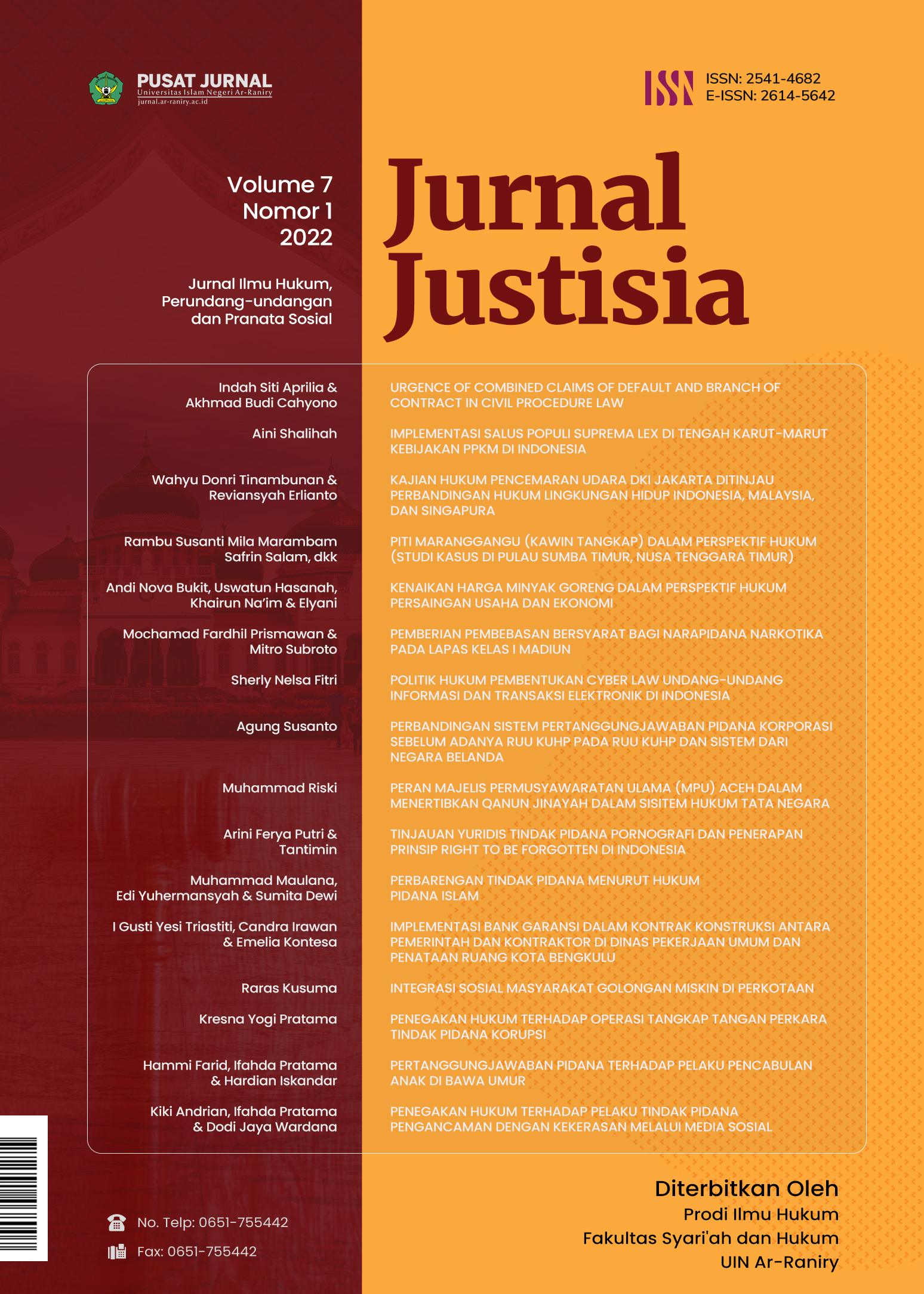Pemberian Pembebasan Bersyarat bagi Narapidana Narkotika pada Lapas Kelas I Madiun
DOI:
https://doi.org/10.22373/justisia.v7i1.12970Abstract
There are provisions concerning criminal sanctions in the implementation of criminal law. where there is a purpose of imposing criminal sanctions for convicted offenders. The purpose of the imposition of criminal sanctions should not be solely to encourage the existence of a retaliation. In this case the Correctional institution is one of the executors of the purpose of the penal system in the improvement system As stated in the legislation, a number of law enforcement efforts to ensure that inmates are punished to be aware of their mistakes, in order to correct themselves and will not repeat crimes as well as then they are acceptable to be returned by the community, actively participate in the development and live a fair living as a good citizen and responsible criminal law, accordingly on law regulations act No. 12 Of 1995 about correctional regulations to regulate all rights of inmates. In the first letter k section 14 of the Act (Act No. 12 of 1995) it says "Prisoners are entitled to parole". Likewise the rights of well-behaved inmates of narcotics justice. Following the current development of narcotic crimes is a complex crime, because narcotic crimes do perpetrators can become victims at once. Best coaching for inmates returning/integrating into society and not being electrically isolated with iron rods.
References
Furqan, Hanin, Sidiq, Muhammad. “Efektifitas Pembebasan Bersyarat terhadap Narapidana Residivis Narkotika (Studi Kasus di Rutan Kelas II B Kota Sigli)”, Journal of Lex Generalis (JLS), Volume 2, Nomor 2 (Februari 2021): 71-89.
Khomaini, Thalib, Hambali, Nuh, Muhammad Syarief. “Pemberian Pembebasan Bersyarat dalam Pembinaan Narapidana pada Lembaga Pemasyarakatan Kelas I Makassar”, Journal of Lex Generalis (JLS), Volume 2, Nomor 2 (Februari 2021): 415-431.
Pasaribu, Suandi Fernando, Syahrin, Alvi, Marlina, Suhaidi. “Pembebasan Bersyarat (PB) bagi Penyalahguna Narkotika di Lembaga Pemasyarakatan Klas I Tanjung Gusta Medan”, USU Law Journal, Volume 4, Nomor 2 (Maret 2016): 70-79.
Putra, Aan Riana, Sari, Ningrum Puspita. “Kendala Pemberian Pembebasan Bersyarat di Lembaga Pemasyarakatan Kelas IIA Sragen”, Recidive, Volume 2, Nomor 3 (September-Desember 2013): 280-289.
Sari, Yulia Puspita, Sulistiyantoro, Hariyo. “Implementasi Pembebasan Bersyarat bagi Narapidana Narkotika di Rumah Tahanan Kelas 1 Surabaya”, Prosiding Seminar Nasional Hukum & Teknologi, Volume 1, Nomor 1 (Desember 2020): 308-317.
Sulianto, Harun. “Hak Narapidana Tindak Pidana Narkotika Untuk Memperoleh Pembebasan Bersyarat”, Jurnal Rechtens, Volume 7, Nomor 1 (Juni 2018): 1-18.
Wongkar, Farly Mervy. “Pembebasan Bersyarat Menurut Undang-Undang Nomor 12 Tahun 1995 Tentang Pemasyarakatan”, Lex Et Societatis, Volume 7, Nomor 6 (Juni 2019): 18-24.
Downloads
Published
Issue
Section
License
The Authors submitting a manuscript do so on the understanding that if accepted for publication, copyright of the article shall be assigned to Jurnal Justisia : Jurnal Ilmu Hukum, Perundang-undangan dan Pranata Sosial, Ar-Raniry State Islamic University, Indonesia as the publisher of the journal.
Jurnal Justisia : Jurnal Ilmu Hukum, Perundang-undangan dan Pranata Sosial right of first publication with the work simultaneously licensed under Creative Commons Attribution-ShareAlike 4.0 International License (CC BY-SA 4.0) that allows others to share (copy and redistribute the material in any medium or format) and adapt (remix, transform, and build upon the material) the work for any purpose, even commercially with an acknowledgment of the work's authorship and initial publication in Jurnal Justisia : Jurnal Ilmu Hukum, Perundang-undangan dan Pranata Sosial. Authors are able to enter into separate, additional contractual arrangements for the non-exclusive distribution of the journal's published version of the work (e.g., post it to an institutional repository or publish it in a book), with an acknowledgment of its initial publication in Jurnal Justisia : Jurnal Ilmu Hukum, Perundang-undangan dan Pranata Sosial. Authors are permitted and encouraged to post their work online (e.g., in institutional repositories or on their website) prior to and during the submission process, as it can lead to productive exchanges, as well as earlier and greater citation of published work (See The Effect of Open Access).

